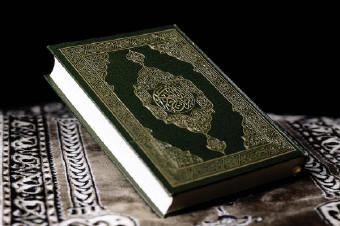The Qur'an

The Qur'an

The
word Qur’an means "recitation” and according to Islamic belief is a
divine revelation made to prophet Muhammad (SAWS) through the angel Gabriel, in
a fragmented form, in a period of 23 years. The Qur’an is composed of 114
chapters called "surah" in Arabic. Each surah is composed of several
verses called in Arabic "ayahs", word that means "miracle
and sign". It is the first source of the Islamic Law and functioned as
a kind of Constitution for the first Muslim community.
The coranical revelations had been registered in rudimentary materials during
the life of prophet Muhammad (SAWS). After his death the Caliph Abu Bakr placed
Zaid Ibn Sabet in charge to prepare a copy of the text of the Qur’an, in a
book form. There were at that time some Hafizes (title given to those who know
the Qur’an by heart) and Zaid was one of them. This copy received the name
"Musshaf" (bookbinding) and was kept under the safekeeping of the
Caliph Abu Bakr himself, and after him under his successor, the Caliph Omar. The
Qur’an assumed the definitive form of a book about twenty years after the
death of the Prophet (SAWS), in the government of caliph Uthman, who put himself
in charge of sending copies of the authentic text to other cities.
Although many critics of Islam try to raise the hypothesis of a possible
alteration, the confrontation with older Qur’ans confirms that it remained
unchanged and that it corresponds to the currently recognized Qur’an in the
Islamic community.
For Muslims, the Qur’an as irrefutable source of Islam and considered as
original is in Arabic language. The various translations are not considered
Qur’an, but meanings of it, many times badly translated. Some present so great
discrepancies that modify the meaning of a verse. The biggest obstacle for a
good translation is the richness of the Arabic language. Even Muslims, who have
the Arabic as their native language, when engaged in a deeper study, make use of
an Arabic-Arabic dictionary that explains the specific meaning of a determined
word in the context of each verse.
Muslims believe that the Qur’an synthesizes and perfects the earlier
revelations, making possible to distinguish between truth and falsehood, not in
the form of dogmatic assertive nor condemnation of other religions, but with the
distinction between the human artifice and the essential meaning of the
religion, between hypocrisy and true faith.
The reading of the Qur’an requires an indispensable initiation and a
preparation for better understanding, especially in the case of a non-Muslim
reader. Try to understand the Qur’an based only on oral information or
specific parts and not in its text as a whole, will lead the unprepared reader
to a distorted understanding. It is important to remark that the Qur’an
had not been compiled in the order of its revelation. The order of the verses in
one surah and the order of the surah inside the Qur’an had been determined by
Prophet Muhammad (SAWS) through divine inspiration, in accordance with the
Islamic belief. The unfamiliarity of this fact tends to generate distortions in
the understanding of the Qur’an.
Throughout three centuries the Qur’an unchained and fed social and political
convulsions, intellectual and moral evolutions, scientific and religious
speculations. The knowledge of its content represents a safe starting point and
primary information for the examination of stereotypes about Islam. Due to the
broadness of its content, the joint effort of the philologist, the historian of
religions and the sociologist have been necessary for a more accurate analysis
of the elements that constitute the Sacred Book of Muslims.
Text
by Maria
C. Moreira
& Marcia Vianna Gaspar.